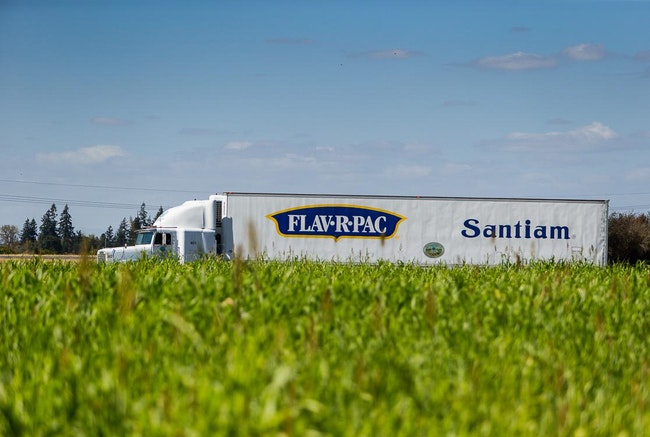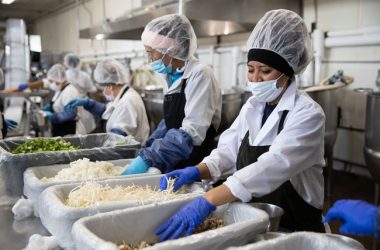
A NORPAC-branded truck transports frozen vegetables in Oregon. (Courtesy/Oregon Department of Agriculture)
The impending closure of a century-old food processing company will have wide impacts on Salem’s economy as nearly 1,000 workers seek new jobs over the holidays and Willamette Valley farmers scramble for a new buyer for next season’s produce.
NORPAC, once Oregon’s largest food processing company, told 924 workers Wednesday they would lose their jobs when the company’s processing plants in Salem and Brooks close in January. Word of the layoffs became public Thursday. Of the workers, 535 hold year-round jobs.
For some seasonal workers, Friday will be their last day working for NORPAC.
The company filed for bankruptcy in August and had arranged a sale of its plants in the Willamette Valley but the buyer backed out in October.
Court filings show the company lost $4 million during September. Its labor costs that month at all its plants, including one in central Washington, were $5.1 million – signaling the scope of economic pain headed Salem’s way.
The company owes more than $100 million to creditors, many of whom are Oregon farmers or agricultural businesses across the Pacific Northwest. Those companies have actively sought to get money they are owed, court filings show.
Generations of farmers have sold their products to the packing company, just as generations have worked at the packing facilities. The company’s Flav-R-Pac brand was ubiquitous in local grocery stores and kitchen refrigerators.
John Asher, a rapid response coordinator at the state Office of Workforce Investments, said his parents and sisters all worked at the Salem plant. His sisters met their husbands there.
Among the creditors are unions representing some of the workers – Teamsters Local 760 and Cannery Local 670. Union officials couldn’t be reached Thursday, but bankruptcy documents show pension funds for each union are owed more than $250,000.
One of about 20 businesses listed as being owed at least $300,000 included Keudell Farms of Aumsville. Scott Neinke, an employee of Keudell Farms Inc., said the farm contracted 650 acres of vegetables to NORPAC.
The largest single claim against NORPAC is $1.2 million owed to Henningsen Cold Storage Co., which has a facility in Salem.
State officials were quick to recognize the impact of the lost jobs.
“The Salem economy is about to have another 1,000 job seekers with similar skill sets searching for employment during the holidays,” state economist Josh Lehner wrote Thursday afternoon in a blog post.
The state planned sessions for early December to help workers obtain unemployment benefits, plan for job searches, and consider training for new skills.
NORPAC’s website said it does businesses with about 200 farms. Those farmers may have to consider changes to their own businesses, said Erik Andersson, president of the Strategic Economic Development Corp., a business recruiting entity.
“It’s a bigger hit than (losing) a major employer,” Andersson said. “It’s a major driver.”
Salem has weathered layoffs before, but the NORPAC closure is larger than anything economists and local businesspeople can recall in decades.
“I can’t think of anything recent where it’s of this magnitude,” said Vann Keo, special program center manager for the Oregon Employment Department.
The layoffs will significantly increase the number of unemployed Salem-area residents. About 8,400 people in the Salem metro area were unemployed in September, according to the latest data from the state employment department.
Some 4,900 people in the Salem area worked in food manufacturing in September, according to state data. The NORPAC jobs in Salem and Brooks accounted for about one in five of the area’s food manufacturing jobs.
Unemployment claims typically rise across Oregon from November through about February, in part because of people losing seasonal work in agriculture, Keo said.
State labor economist Pat O’Connor said the mid-Willamette Valley typically loses about 700 seasonal agricultural jobs in November and December.
O’Connor said one big economic impact will likely be for farmers and growers who process foods with NORPAC and could lose that outlet if someone doesn’t step in to take over the food factories.
“They are so big and they have so many growers you hope there’s going to be room for somebody to step in here,” he said.
VIDEO: In a 2016 NORPAC video, farmer Gary Cook described his family’s history in farming.
NORPAC started in Salem in 1924, processing fruits and vegetables into canned and frozen products. The company processed much of the produce grown in the mid-Willamette Valley.
In 2013, the company announced plans to move its headquarters from Stayton to Salem and built a new cold storage warehouse, investing $5 million according to SEDCOR. At the time, company officials had a rosy forecast.A NORPAC-owned cannery in Hermiston, then the town’s largest employer, closed its doors in 2017, as part of what company officials said was a shift toward frozen food manufacturing.
NORPAC in September said it would close its Stayton plant and idle 485 workers, but later delayed that closure. The status of those jobs couldn’t be determined Thursday.

NORPAC sent a layoff notice to employees Wednesday.
Shawn Campbell, NORPAC’s president and CEO, explained the company’s fate in a notice delivered to employees Wednesday. He said the company got a short-term loan to fund operations through Oct. 31 but no other financing has been arranged.
“While NORPAC will continue to seek additional financing and to have discussions with various companies about purchasing its facilities, there is no guarantee that this will happen,” Campbell wrote.
Jobs in food processing have increased in Oregon even as manufacturing has declined since 2005, Lehner said. Overall, the industry is doing well, but much of that growth has been in brewing.
Wednesday’s announcement comes after years of closures and consolidations among some food processors across the Northwest and in Salem. In general, companies are finding they need to integrate and grow larger to stay in business, O’Connor said.
Once thriving, companies have had to cut costs in recent years as profits in canned and frozen vegetables declined.
In 1999, Agripac, a frozen vegetable processing company, went bankrupt and parts were acquired by AgriFrozen Foods Inc. Two years later, AgriFrozen shut its Woodburn plant, eliminating 300 jobs, according to a 2001 article in the Statesman Journal.
In 2001, PictSweet Mushroom Farm closed, leaving at least 300 people without work, according to The Oregonian.
Andersson said he’s concerned for the region’s agriculture if NORPAC leaves, but said it’s still possible a buyer could be found. No matter what, he said there needs to be a food processor in the region.
“It gives us our marching orders: fill those buildings up again and protect that link in the supply chain,” he said.
This story was produced by reporters Troy Brynelson, Rachel Alexander, Saphara Harrell and Jake Thomas of Salem Reporter.









